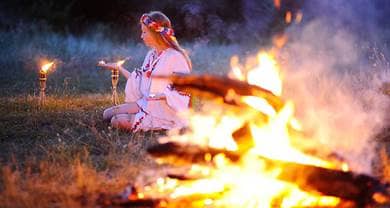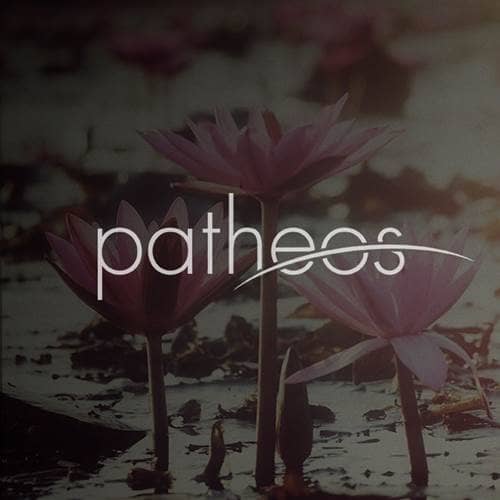- Trending:
- Forgiveness
- |
- Resurrection
- |
- Joy
- |
- Trump
- |
- Kamala Harris
- |
- Supreme Court

RELIGION LIBRARY
Paganism
Human Nature and the Purpose of Existence
If you draw a map of the entire universe, it is only complete if it includes yourself in it. Likewise, "nature" is only complete if it includes "humanity" within it. Pagan wisdom traditions have no consensus on how to understand human nature or the meaning and purpose of life, other than for each individual to forge his or her own sense of self-understanding, meaning, and purpose. Within this broad framework, here are several ideas that can be found within the contemporary Pagan community.
The first is the principle that humanity is part of nature, not above it or outside it. Recognizing that no map is complete without the mapmaker means that the concept of "human nature" requires as much attention to "nature" as to "humanity." Physical characteristics of being human: having a body, gender and sexuality, sensuality, and the capacity to relate to the environment in terms of pleasure and pain - these are all characteristics that matter to Pagans who seek to understand humanity. Spiritual or metaphysical beliefs are important, too, if understood as part of nature rather than as pre-given truth.
Closely related to this is the idea that humanity can only be understood in relation to the natural world. Nature is essentially relational: every part of nature is influenced by, shaped by, limited by, and defined in terms of struggle with its environment. Since human beings share so much in common with other aspects of the natural world, from similar body chemistries to shared DNA, much can be learned about humanity simply by observing the laws of nature, even though the environment cannot fully disclose what it means to be human (for example, no other species fully shares in human language).
Many Pagans would affirm that humanity is both conditioned by nature and inspired by evolutionary possibility. Nature imposes limitations on the experience of being human: every human being dies, and suffering, aging, loss, sickness, and hunger are just as much part of the human landscape as joy, pleasure, love, happiness, and well-being. Part of being human is learning to accept such limitations, even if it is also part of human nature to struggle against them. Indeed, much of the thrust of nature religion involves finding the balance between respecting nature even while furthering the innate human struggle against the limitations imposed by nature.
Through mythology, magic, and ritual, Pagan religions offer to their adherents tools to deepen the experience of being human in nature. The Fates may determine when individuals age, sicken, and die - but the concept of "the Fates" as mythological forces is part of the human quest to find meaning in nature. Likewise, magic and ritual - whether for self-seeking purposes such as personal gain, or for more "noble" pursuits as the healing of another - provide a spiritual framework to humanity's inborn propensity to struggle against the limitations inherent in being human.
It is important to note that, as a whole, Paganism offers no pre-given purpose of existence. Although mythological wisdom from around the world offers suggestions as to the purpose of life, no dogmatic idea of one eternal, unchanging truth is universally accepted among Pagans. Even within mythology, many different ways of approaching the question of life's purpose can be found. Honor and virtue often are revered within mythic stories, but even these values are culturally relative - in other words, different cultures understand them in different ways.
Many Pagans would maintain that humans are, both individually and collectively, free to chart their own course, to determine their own purpose. Without a pre-given, "supernatural" way of understanding life's meaning, or even a consensus within the mythologies of the world, Pagans are free to create their own meaning or sense of purpose. Although such freedom can be abused (for some, the purpose of life can mean little more than selfish pleasure seeking, even at the expense of others), most Pagans would argue that one's own freedom to decide meaning is more important than efforts to judge or evaluate the meaning-choices of others.
Within the freedom to chart one's own purpose, resources exist that can help along the way. Mythology often teaches core values (honor and virtue are good, lying and stealing are bad) that can help one to function in social contexts and can shape an understanding of happiness and well-being. History, likewise, offers examples of heroism, creativity, wisdom, and other qualities worth emulating, while society establishes parameters of rights and responsibilities within which one's purpose may be forged. Science (biology, psychology, and sociology) all offer clues to help differentiate between lives that are more (or less) productive, effective, and happy. All these resources are available to help each individual chart his or her sense of purpose and meaning.
Rather than one unchanging purpose being handed down from an otherworldly god, the purpose of humankind as a whole emerges from the combined individual purposes of all people. One could say, then, that the purpose of being human is to live a free and self-directed life, in pursuit of happiness, recognizing nature-imposed limitations but also choosing to struggle against them, whether through science, spirituality, or art. It is on the continuum between finding happiness and contentment with the way things are, and striving to make things better, that the ultimate purpose of being human is revealed.
For many Pagans, maintaining balance between humanity and nature is also an important purpose of being human. Humans exist not merely to enjoy the bounty of the environment, but also to serve and protect the environment, not only for future generations of humans, but indeed for the sake of nature itself. Although such a values-driven understanding of life's purpose is far from universally held within the Pagan community, for many this is an important part of their chosen spirituality. In a spirit of noblesse oblige, humanity's intelligence and vision carry with them a responsibility to care for the well-being of nature as a whole.
Finally, some Pagans do accept a metaphysical understanding of life's purpose, derived from mythology and spiritual beliefs. Living a good life can create positive karma, which can lead to a blessed afterlife existence and/or a favorable reincarnation.
Study Questions:
1. What is the role of the individual in defining existence?
2. What can the laws of nature teach about existence?
3. Why is there no unified Pagan belief about the purpose of existence?
4. What resources exist to help Pagans understand their human nature?
5. How should humans interact with nature?










